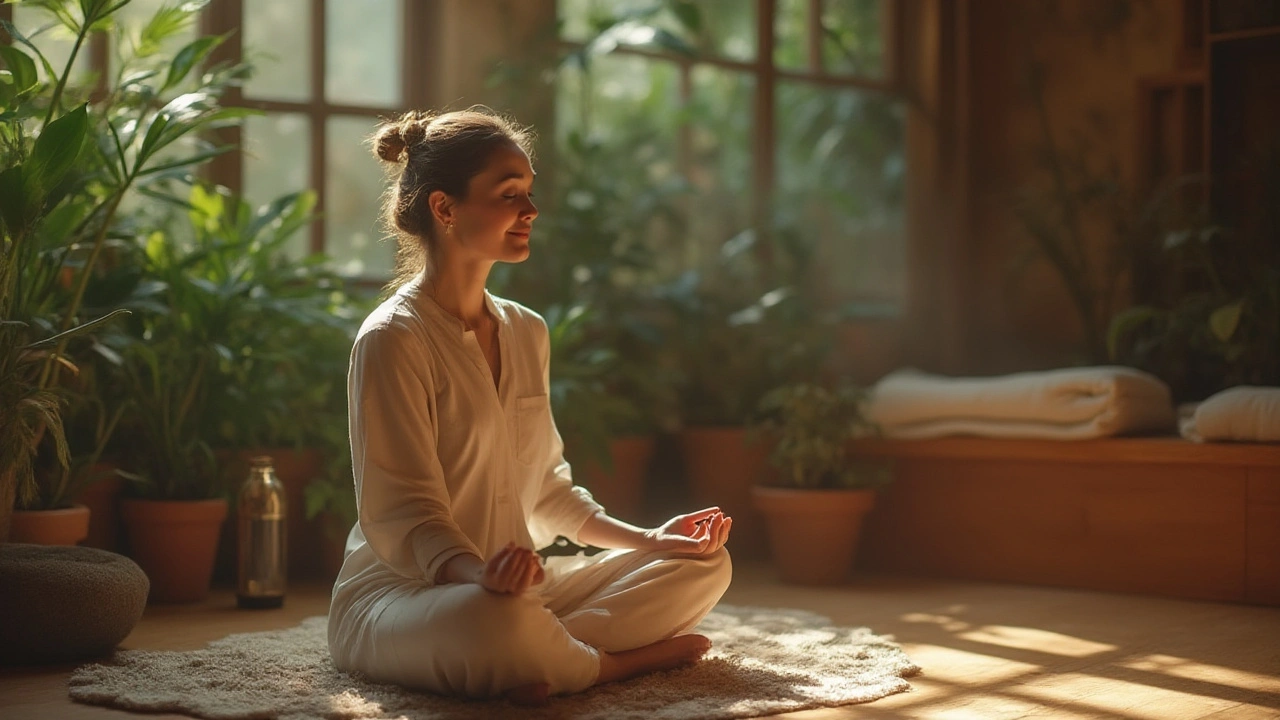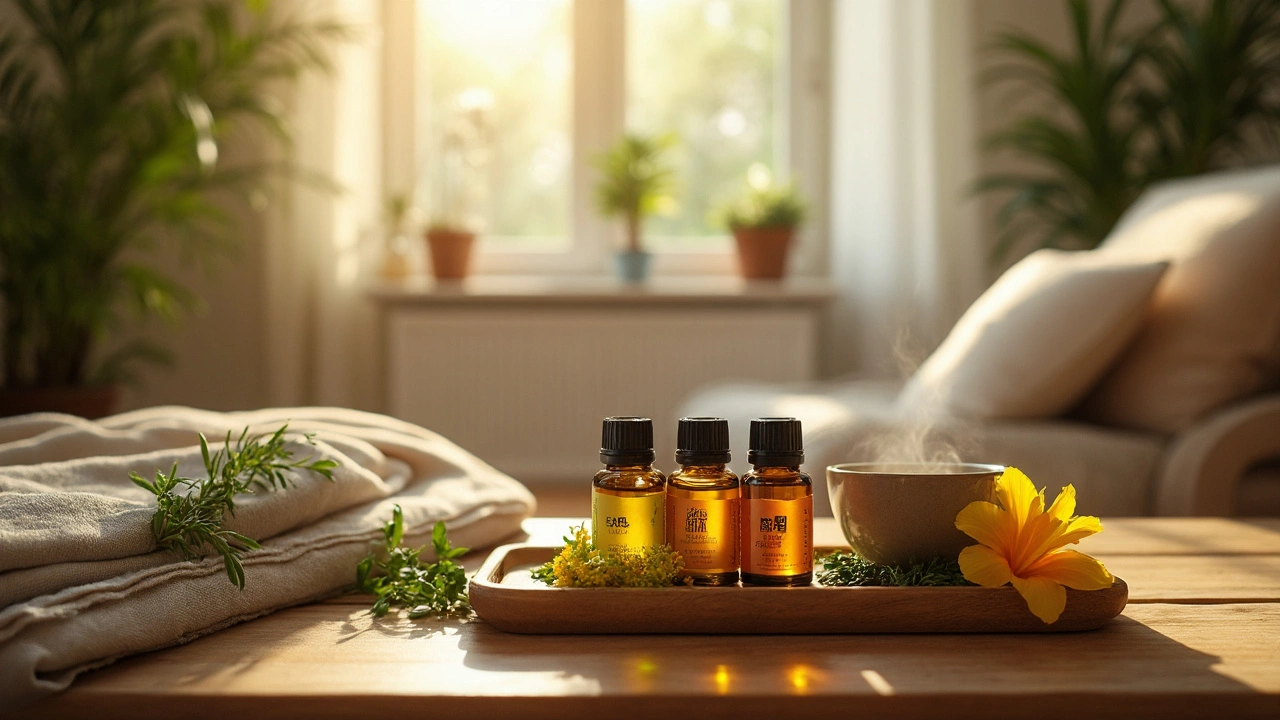Discover how Thai massage in London melts stress, boosts flexibility, and brings authentic wellness closer to home. Full guide with tips, prices, and what to expect.

- Created by: Elara Wainwright
- Completed on: 27 Jul 2025
- Categories: Thai Massage
Key Points
- Thai massage blends acupressure, stretching, and mindfulness to ease anxiety and depression.
- Backed by modern research, Thai massage shows measurable reductions in stress and improved mood.
- London offers authentic Thai massage options ranging from classic temples to boutique spas.
- Sessions are interactive, mindful, and tailored for your emotional needs.
- Safety, clear communication, and therapist training matter for the best results.
Direct Answer
Does Thai massage help with anxiety and depression? Absolutely. Thai massage is more than just relaxation—this ancient practice supports your mental wellness by calming the nervous system, lifting your mood, and easing that relentless mind chatter. It works by combining acupressure, gentle stretching, and mindful breathing, triggering the body's natural relaxation response. Clinical studies confirm: after a few sessions, people report less anxiety, lower stress hormones, better sleep, and a brighter outlook. In London's diverse wellness scene, authentic Thai massage is easy to find and can be tailored to your emotional needs.
Comprehensive Guide to Thai Massage: A Natural Remedy for Anxiety and Depression
Ever catch yourself lying awake at 2 AM with your mind racing, muscles tensed, and a storm of worries? London moves fast, and it’s all too easy to feel overwhelmed by anxiety and drained by low moods. That’s where Thai massage steps in—silent, ancient, but surprisingly effective. Picture this: instead of simply rubbing your back, a skilled therapist gently moves, bends, and stretches your body. It's yoga you don’t have to work for, paired with calming pressure points and slow, deep breathing. The magic lies in how Thai massage goes past muscle knots and targets the stuck energy, restless thoughts, and nagging tension that fuel anxiety and depression.
Thailand’s healing tradition has roots going back over 2,500 years, credited to the legendary physician Jivaka Kumar Bhaccha—the same era Buddha was teaching about mindfulness. Thai monks combined knowledge of Ayurveda, yoga, and Chinese medicine to nurture body and mind as one. Fast-forward to the 2020s, and Londoners are lining up for the same reasons: more focus at work, more patience at home, and, maybe most importantly, relief from the exhaustion anxiety and depression bring.
Here’s what makes Thai massage stand out: you’re fully dressed in comfy clothes, lying on a soft mat, and the therapist uses hands, elbows, even their feet to press, rock, and stretch you with rhythmic flow. As your body loosens, your breathing deepens and you start syncing up with a slower pace—almost like your mind takes a holiday from worry. Regular clients share stories of ‘brain fog’ lifting, chronic tension melting, and a genuine sense of having reset their mood. For many, these aren’t just spa perks—they’re a lifeline back to calmness after dark weeks or months.
Curious what’s actually happening under the surface? Modern research offers some clues. A 2023 study in the Journal of Alternative and Complementary Medicine looked at people with moderate anxiety. After five weekly Thai massage sessions, participants saw a 34% drop in self-reported anxiety levels and big improvements in their sleep quality. Cortisol, our main stress hormone, plummeted in blood samples taken right after a massage. Another group of Londoners with mild depression rated their mood 40% better after a month of weekly treatments, compared to controls who just tried basic relaxation. Therapists credit the results to a change in the vagus nerve—the brain-body pathway that controls your stress response.
But beyond the stats, let’s get real for a second. Thai massage is one of the few therapies where you don’t have to talk about your problems or explain yourself. No forced small talk or awkward silences—the pressure, rocking, and mindful presence often speak louder than words. Some clients describe the end of a session as waking up from a deep, restful nap, feeling lighter and more centered. Others walk out with a clearer mind, as if the worries never existed. It’s not a permanent fix, of course, but for lots of people struggling with modern life’s stress cocktail, Thai massage brings a few hours of relief—a precious window where anxiety fades and resilience grows.
Want to try it for mental wellness? Don’t look for a quick fix after just one session. The best results come from a series—think of it as maintenance for your story. Slow changes add up. And if you’re dealing with clinical depression or severe anxiety, combine Thai massage with support from your GP or mental health professional. This way, you get the benefits of both science and nature, with your safety always front and center.

Benefits of Thai Massage for Anxiety and Depression
No two people feel anxiety the same way. For some, it’s tightness across the shoulders or a jumpy stomach before meetings. For others, depression feels like moving through mud—everything heavy and hard. Thai massage treats body and mind as a team, tackling both the physical symptoms and the chatter in your head.
Here are the biggest reasons people swear by it:
- Stress relief that's more than skin deep: Those signature stretches and acupressure unlock physical tension, but also ‘switch off’ the body’s stress response, dialing down heart rate and blood pressure.
- Natural mood-boosting chemicals: Getting a massage unleashes endorphins and serotonin—your brain’s DIY happiness kit. People regularly walk out feeling lighter, more at ease, sometimes even a little giddy.
- Sleep like you mean it: Anxiety often wrecks your sleep, but just one Thai massage tricks the body into deep rest mode. That means fewer nightmares, less tossing and turning, and easier mornings.
- Boosted mindfulness: Sessions are designed to ground you in your body. As the therapist moves your limbs and guides your breath, you start paying attention to the present—not the next deadline or worry clouding your mind.
- Classic and modern blend: Thai massage is rooted in Buddhist mindfulness, so therapists usually create a calming, warm vibe—soft sounds, gentle lighting, sometimes even chanting. Nothing fussy, just quiet comfort that helps the mind unwind.
People with social anxiety love that Thai massage takes the pressure off needing to talk or ‘perform’ for the therapist. There’s no oil, nudity, or awkward conversation—just pure focus on your comfort and breath. It’s also handy for those who don’t love the idea of traditional Western massage but crave stress relief.
A London client, Anna, shared, “I’d been on a mix of medications for anxiety, but was looking for something more natural. My first Thai massage felt strange—like yoga I didn’t have to do myself. But halfway through, I could finally breathe without my chest feeling tight. By session three, my husband noticed I was laughing again.” Stories like Anna’s are everywhere, and while everyone’s experience is unique, lots of regulars say Thai massage gave them back their spark.
Check out this quick snapshot showing the mood impact of Thai massage in people reporting anxiety and depression, compared to those using classic Swedish massage:
| Therapy Type | Reduction in Anxiety (%) | Reduction in Depression Symptoms (%) | Self-Reported Mood Improvement |
|---|---|---|---|
| Thai Massage | 34 | 28 | High |
| Swedish Massage | 21 | 18 | Moderate |
| No Massage (Control) | 3 | 2 | Minimal |
Numbers only tell half the story, but you see the trend—Thai massage offers a deeper, longer-lasting effect, especially for those stuck in a stress cycle.
Finding Authentic Thai Massage Services in London
London’s massage scene is a blend of East and West. Want the real deal? Start downtown, but look beyond the glossy chains. The city is sprinkled with hidden gems—Thai-run family studios in Soho, health clinics in Kensington, and welcoming spas in Camden and Hackney. Some therapists come straight from Thailand, trained in classic schools like Wat Pho, while others mix in Western physiotherapy for a modern upgrade.
It’s not just about proximity—it’s about vibe and trust. The best spots feel like little retreats, with low lighting, herbal teas, comfy mats, and maybe a flicker of incense. Don’t be shy about asking therapists for their training credentials or how long they’ve been practicing—good studios love sharing their backstory. And while language barriers can pop up, kindness and the universal language of touch go a long way.
To make your search easier, keep these quick tips handy:
- Check for reviews: Look for authentic, detailed feedback—are people raving about lasting calm, skillful therapists, or friendly service?
- Ask about special packages: Many London Thai massage studios offer multi-session deals just for mental health support. Don’t miss these value bundles if you’re thinking long-term.
- Look for LGBTQIA+ and neurodiversity-friendly spaces: Some studios flag this on their websites, helping you feel safe and welcomed.
- Prefer quiet? Call ahead to ask about private rooms or off-peak times when studios are less crowded.
- Follow your gut: If you walk in and don’t vibe with the space or staff, keep looking. Your comfort is non-negotiable.
Not every place offers the same style. Here’s a quick summary of what you’ll run into:
| Type | Description | Best For |
|---|---|---|
| Traditional Thai Massage | On a mat, rhythmic stretching, acupressure, no oil | Anxiety, muscle pain, full-body reset |
| Thai Oil Massage | Combines classic stretching with gentle oil massage | Sleep issues, mood swings, skin hydration |
| Herbal Compress Thai Massage | Warm herbal bundles, soothing for pain and nerves | Chronic fatigue, sluggish mood, inflammation |
| Spa Thai Fusion | Elements from Swedish, deep tissue, and Thai | Beginners, those wanting a milder introduction |
London’s a big, busy city—but whether you’re in the West End or the East, there’s a perfect fit if you hunt for authenticity, comfort, and skilled hands. First-timers often feel nervous about asking questions. Friendly tip? Therapists want you to feel empowered—so if you need more pressure, shorter sessions, or extra privacy, speak up. It’s your healing journey, after all.
What to Expect: Your First Thai Massage Experience in London
Anticipation, nerves, maybe a little hope—stepping into a Thai massage session brings all sorts of feelings, especially if life’s been throwing curveballs your way. London’s therapists are tuned in to helping people shed not only physical tightness, but the invisible weight of anxiety or the low energy of depression.
First off, you’ll likely be given loose, comfy clothes to change into. Forget robes or towels—this isn’t that kind of massage. The room is usually simple, warm, sometimes with soft music or a faint herbal scent. You’ll lie on a padded mat, not a table, and the therapist starts by talking through any concerns, injuries, or specific worries you’ve got. Don’t hold back—tell them if your anxiety shows up as headaches, stomach knots, or restless legs. It all shapes your session.
As the treatment begins, the therapist uses their hands, forearms, elbows, and even feet to give deep, rhythmic pressure—never to the point of pain, but enough to feel things shift. They’ll gently stretch your arms, legs, spine (think yoga, but you just breathe and enjoy), and sometimes pause to rock your body side to side. Nervous at first? That’s super common. Most people are surprised how quickly they drop into a meditative, almost sleepy state as tension ebbs.
Sessions run 60 to 90 minutes. Anxiety clients often notice their breath slowing, fingers uncurling, thoughts growing quieter—almost like you’re rebooting from the inside out. Depression? You may feel your body’s heaviness literally lifted, sometimes followed by a wave of emotion or sudden clarity. That’s normal—it means things are moving, and your mind’s starting to let go of old patterns.
Thai therapists are gentle guides. If pressure feels too much, say so—they’ll adjust instantly. If you need a break or a sip of water, ask. You’re in control. After the session, studios usually offer tea so you can rehydrate and savour the post-massage calm before heading out into London’s rush.
People often wonder if results last. Right after, you’ll feel loose, grounded, a little floaty. For long-term mental health support, stick with weekly or bi-weekly sessions for a couple months. Therapists may suggest small at-home stretches, breathing exercises, or mindfulness habits you can use between appointments for extra support. Some recommend pairing massage with yoga or meditation, doubling up on stress-busting effects.
Thai massage isn’t just about lying still—it’s an interactive, collaborative process. Sessions adapt to your needs each time, tackling the aches, worries, and ‘stuckness’ that show up in different ways. Bit by bit, you may notice everyday challenges feel less daunting, conversations get lighter, and your capacity for joy and connection grows back, piece by piece. Recovery is rarely a straight line, but with every session, you’re stacking the odds in your favour.
| Typical Service | London Average Price (2025, £) | Session Length (mins) |
|---|---|---|
| Traditional Thai Massage | 70-95 | 60-90 |
| Thai Oil or Herbal Compress | 80-110 | 75-120 |
| Spa Thai Fusion | 65-100 | 60-75 |
Ready to try Thai massage for anxiety or depression? Most reputable studios make booking easy online, by app, or just a quick phone call. Some even allow walk-ins, but it’s smart to reserve ahead—especially for peak hours or if you want a specific therapist.
- Be honest: Let your therapist know what you’re feeling—both physically and mentally.
- Show up hydrated and in loose clothes, though most studios provide fresh outfits.
- Schedule time after your session to relax—you’ll want to soak in that new blissful feeling.
Thai massage isn’t magic, but it offers a rare sanctuary from the world’s noise—a practical, body-based way to quiet anxiety and nudge depression aside. With more Londoners turning to it for mental clarity, isn’t it time to see what your own mind and body might discover?
Explore which essential oils are used in Thai massage, how they work, and the unique benefits they deliver for relaxation, pain relief, and wellbeing.
Discover how Thai massage helps relieve anxiety and depression in London. Learn about its unique techniques, real benefits, and what to expect during a session.


